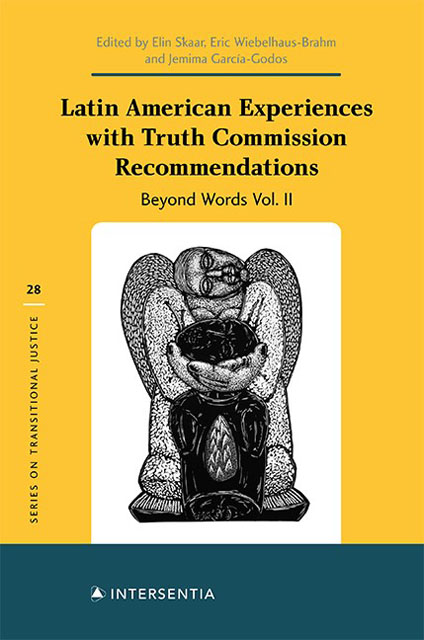Ecuador’s Truth Commission: Official Support, Weak Compliance
Published online by Cambridge University Press: 19 November 2022
Summary
INTRODUCTION
The Truth Commission of Ecuador, Sin verdad no hay justicia, was established in May 2007, with a mandate to investigate human rights violations committed between 1984 and 1988 and other special cases. Although the period investigated was extended up to 2008, with Rafael Correa as President, the core focus of the Commission's investigations was this first period of time established by the mandate when León Febres-Cordero's administration crushed the guerrilla group known as Alfaro Vive Carajo! (AVC), as well as different social movements, including human rights organizations. The Commission's final report, released in September 2010, offered information about 456 victims including 365 victims of torture, 269 victims of illegal detention, and 68 victims of extrajudicial execution (Comisión de la Verdad 2010, 53).
The Ecuadorian Truth Commission had some salient features around the truth-seeking process. One was the high degree of support from President Rafael Correa's administration, despite several extensions in its functioning. At the same time, the Commission worked under strong supervision from the victims, who were represented through a Committee of Support and had a multidisciplinary, although very young, work team. In addition, the Commission considered a large list of recommendations organized in a well-defined structure according to existing international human rights instruments. Because of this, the Ecuadorian Truth Commission shows some of the patterns that define contemporary truthseeking mechanisms noticeable in the more recent Latin American truth-seeking commissions such as the Paraguayan one (Valencia 2011).
The Commission formulated 155 recommendations dealing with reparations, justice and institutional reform. After the Commission closed its operations, several State agencies were in charge of following-up and fulfilling its recommendations. The main agencies involved were the Ombudsman's Office, the Ministry of Justice, Human Rights and Beliefs, and the General State Prosecutor's Office.
This chapter seeks to provide an assessment of the level of implementation of the recommendations formulated by the Truth Commission, examining some actors and factors that either have impelled the process or have hindered it. To do this, we present a brief account of the scenario in which the Truth Commission was created, as well as the social and political context that motivated the investigation. This allows us to comprehend the reconstruction of the events that characterized the period from 1984 to 2008 in Ecuador, but also to understand the role of actors such as Correa ‘ s government during the creation of the Commission and later during the implementation of the recommendations.
- Type
- Chapter
- Information
- Latin American Experiences with Truth Commission Recommendations: Beyond Words Vol. II , pp. 233 - 276Publisher: IntersentiaPrint publication year: 2022



